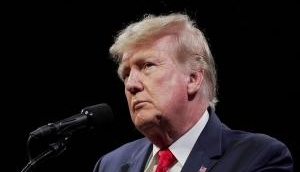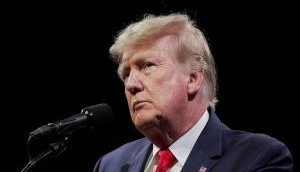Tale of two statements: Sharif offering crumbs to India, ball in Modi's court

The call
- After the Pathankot terror attack, on 5 January, Pak PM Sharif called up Modi
- The call came after both NSAs reestablished contact, in line with the recently-reached understanding
The statements
- India\'s statement said Sharif had promised action against the Pathankot planners and perpetrators
- Pakistan\'s statement said its govt was working on leads given by India and \'investigating\' the matter
More in the story
- Why did both sides give such different statements? Is it just the way diplomacy works?
- Is Pakistan trying to offer crumbs to Modi to keep the peace process going?
Pakistan Prime Minister Nawaz Sharif called up his Indian counterpart, Narendra Modi, from Colombo on 5 January, in connection with the Pathankot terrorist attack.
The call came after the National Security Advisors on both sides reestablished contact, in line with the understanding reached at their meeting in Bangkok in December.
It's obvious that Sharif is trying to ensure that the Indian political leadership can continue with the Modi-initiated peace process and, particularly, to send foreign secretary Jaishankar in the middle of January, as planned.
Read: #PathankotAttack leaves govt, BJP and RSS divided on Pakistan policy
Of course, Modi would like his initiative to continue. He has invested considerable political capital, and would be embarrassed if things are abruptly halted even before they have actually taken off.
But the question still remains: will Pakistan do enough to tackle the terrorists responsible for the attack for Modi to go ahead?
Modi and Sharif's offices issued statements after the telephone call, and gave different versions of the conversation. This is not unusual in diplomacy because each side seeks to emphasise what's important from its viewpoint - both from the angle of domestic opinion and projection to the international community.
However, in this instance, do the statements reveal what will be the likely outcome of the NSA talks?
India's version
According to the Indian statement, Modi "strongly emphasised the need for Pakistan to take firm and immediate action against the organisation and individuals responsible for and linked to the Pathankot attack".
It further asserts that "specific and actionable information has been given in this regard to Pakistan".
Taken together, this implies that the Indian authorities have concluded on the basis of the information that Pakistan-based terrorists have undertaken the attack. They are also convinced that the information is such that Pakistan can take action.
It's obvious Sharif is trying to ensure India can continue with the Modi-initiated peace process
If the Indian statement had confined itself to what Modi told Sharif, it would have been only in keeping with the Indian stand. But it goes further. It emphasises that Sharif assured Modi that "his government will take firm and decisive action against the terrorists".
In the context of the conversation, this would clearly imply that Sharif agreed that the terrorists were from Pakistan, and the information given is of such a nature that action can be taken against them.
Pakistan's version
This is not what the Pakistani statement mentions even remotely. It is absolutely silent on the question of action.
It confines itself to what the Pakistan Foreign Ministry had officially stated on 4 January - that leads have been provided by India and that they would be investigated. This statement has Sharif telling Modi that his "government was working on the leads and information provided by the Indian government", and that "the Pakistani government would investigate this matter".
Also read- Exclusive: India tipped off on 25 Dec about Pathankot. Even as Modi met Sharif
This means that not only will Pakistan follow the Indian information, but carry out its own investigation. This is the only inference that can be reached by the use of the word "investigate".
It is also noteworthy that the Pakistan Foreign Ministry had largely confined itself to working on the leads provided by India.
Having taking the position that it will investigate the matter and work on the leads given by India, it is obvious Pakistan cannot have its Prime Minister prejudge the issue. Action can only follow a determination that the terrorists were Pakistani.
According to India's statement, Modi "emphasised the need for Pak to take firm & immediate action"
The Pakistani statement emphasises that, in keeping with precedents, terrorists were trying to derail the process. It goes on to say that the two Prime Ministers "agreed that a cordial and cooperative relationship between the two countries would be the most appropriate response to the nefarious designs of the terrorists".
The Indian statement makes no mention of any such feeling expressed by Modi.
The inference
By using the generic word "terrorists" and stating that they are spoilers of the normalisation process, was Sharif indirectly admitting that Pakistan-based terrorists were responsible for the attempt?
This is not so, because Pakistan holds that there are groups and individuals in India that are opposed to the process.
Thus, the two statements reveal that despite the intensive contact between the two NSAs, Pakistan has not decided to take "firm and decisive" action. Such action would require major rethinking in the Pakistan army on the role of terrorism in its security calculus.
It would almost be of the same order as turning on the Taliban immediately after 9/11.
The Taliban parallel goes further. After distancing itself from them in the wake of the US threats, the Pakistan army continued its support to build them up. Consequently, within a few years the Taliban were able to mount a successful insurgency against Kabul that still continues.
Chances are that Pakistan will try to spin this matter out, and offer only crumbs to Modi. How will he respond on the Jaishankar visit and beyond? The ball is really in his court.
More in Catch:
#PathankotAttack: Modi has 3 choices. He needs to pick one and stick to it
Coastal road on Arabian Sea: how Maha govt is pushing Mumbai towards disaster
Malda riot: Mamata's Muslim appeasement is coming back to haunt her
Chemistry 101: Guess what? The Periodic Table is finally complete!
First published: 7 January 2016, 1:54 IST





![BJP's Kapil Mishra recreates Shankar Mahadevan’s ‘Breathless’ song to highlight Delhi pollution [WATCH] BJP's Kapil Mishra recreates Shankar Mahadevan’s ‘Breathless’ song to highlight Delhi pollution [WATCH]](https://images.catchnews.com/upload/2022/11/03/kapil-mishra_240884_300x172.png)

![Anupam Kher shares pictures of his toned body on 67th birthday [MUST SEE] Anupam Kher shares pictures of his toned body on 67th birthday [MUST SEE]](https://images.catchnews.com/upload/2022/03/07/Anupam_kher_231145_300x172.jpg)






